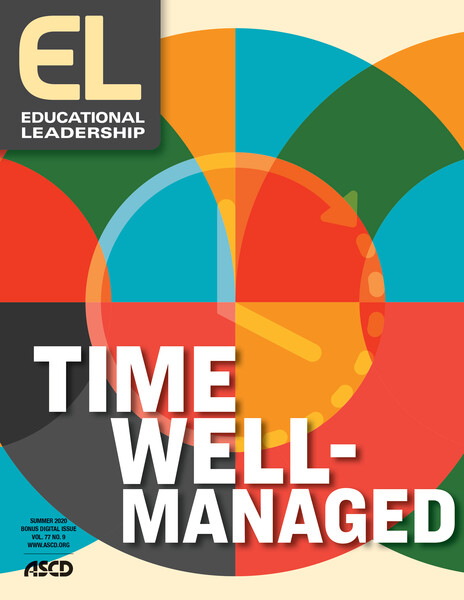Last fall, I began pursuing a graduate degree in educational leadership, management, and policy at Seton Hall University. With a cohort of 15 other local educators, most of them women and many of them working parents, I took two classes per semester, one in-person class over the course of two weekends, and the other online. Going into the program, I knew I was facing a time crunch at every angle: I am a mother of four who teaches English full-time at a high school that's an hour away from where I live. Every day, I live out the maxim that "time is a context to be mastered" (Bennis & Goldsmith, 2010).
At work, there were challenges outside of my control that made things even trickier. A spike in the student population at my school resulted in an average of five additional students in each of my five classes. Classroom space was at a minimum, and since I shared a room with two other teachers who traveled between classrooms, there was no time to linger before or after most classes. The dearth of quiet spaces to do work during the school day also posed complications. And it's not like I had a lot of solitude or free time at home. Given all these factors, I knew that I was at risk of adopting the stressful attitude that results from what Arianna Huffington calls "time famine" in her book Thrive. Yet I wanted to be able to approach my work—both in my teaching and for my degree program—with a peaceful sense of "time affluence" (Huffington, 2015).
As of this writing, I am beginning my third semester as a working-mom graduate student. During the first semester, as things started to get intense, I made a number of intentional choices aimed at creating a little more time affluence in my life—and in the way I approach work. What I found was that many of the "hacks" I discovered, regardless of the necessity that brought about their invention, improved my teaching and assessment practices. They were especially compatible with my school's recent transition to remote learning. They also made me a better student.
Here are three takeaways on creating time affluence that I developed after reflecting on my first semester.
Capitalize on Commute Time
Each year, I reread the books I am teaching to keep myself fresh, and this is where I faced my greatest time crunch this year. What I decided to do was listen to the books on my commute back and forth to school, using the Hoopla and Overdrive apps from my local library to download texts such as The Great Gatsby and The House on Mango Street. In addition to these titles, I was also able to listen to other titles in a variety of genres to recommend to my students for independent reading (and later recommend to my school for library purchases). I also listened to nonfiction books that proved resourceful in supporting claims in the reaction papers and discussion posts I wrote for my graduate classes. These included Punished by Rewards by Alfie Kohn, Brave, Not Perfect by Reshma Saujani, Quiet by Susan Cain, Multipliers by Liz Wiseman and Gregory McKeown, and Mistakes I Made at Work by Jessica Bacal. In addition, I leveraged the bluetooth technology in my car to speak with fellow cohort members via both voice text and phone.
Cut Down on Paper Pushing
I also made some changes to make grading and reviewing student work more adaptable to my busier life. Since I lacked both time and space to collect and grade hard-copy papers from students, for example, I migrated my assignment rubrics to electronic versions in Schoology, the learning-management system my school uses. Realizing how much more ease of use there was in clicking on the rubric criteria and commenting in specific categories, I couldn't believe it had taken me so long to go this route. I was even able to grade one or two papers on my phone in the long line at the Price Club or during halftime at my son's basketball game, utilizing the recording element to speak some comments on students' papers.
All of my high school classes participate in book club units, and at each meeting, students create several Google Slides to populate a full presentation they give at the end of their book study. To track the groups and the slides for their projects, I set up a hyperdoc that contained links to each group's project. Putting all of the links to students' slide decks into one Google Doc turned out to be a great project management tool as well, since I attached the hyperdoc to the Schoology calendar so students could reference it. Having a centralized place for the projects also helped me cut down on lost instructional time for procedural issues—something I wanted to do as much as possible.
At the end of the unit, I asked student groups to record their final book club discussions using either voice memos on their phones or Vocaroo.com. They then uploaded their discussions to Schoology, and I listened to them on my commute home.
Get Over Gatekeeping Guilt
As I struggled with my own homework load early in the mornings, on evenings, and on weekends, I had a minor epiphany: This must be how my students feel. They might not have families to take care of, but many of them are committed to co-curricular activities and have part-time jobs or other obligations, and balancing those responsibilities with their course load can be a tall order for teenagers. As a result of this revelation, I began to give students an additional 25 minutes per week in class to read class-assigned books. I then used this time to confer with small groups of students about their reading and writing.
This led to other experiments in which I saved time and energy—and arguably improved my teaching—by letting go of traditional notions of accountability enforcement. One week, because of the way our rotation schedule fell, I had two reading-check assessments scheduled for my 12th graders: one on a Monday and the other on a Friday. By the time Friday rolled around, the last thing I wanted was another three full class sets of quizzes. Instead, I gave a partner quiz, an assessment type that a colleague of mine had piloted and implemented successfully. Not surprisingly, my students did not complain about this shift! As pairs and triads worked to answer the questions together, I realized that their discussions were a form of pre-writing, and this made their written answers stronger in the end.
Later in the unit, I decided to pilot a threaded discussion on Schoology in place of a traditional quiz. I found that I not only enjoyed reading the students' responses to one another's comments, but also appreciated the opportunity to participate in the conversation myself, adding links to articles and books of interest as the digital discussion unfolded. I soon realized that we had collectively hacked the usually static form of discussion boards to create more space for actual research and writing skills such as crowdsourcing nonfiction articles, developing arguments, practicing new vocabulary, and integrating quotations.
My formative feedback now had a place where it was housed and where students could return to it for reference. For example, at the end of our unit on The Kite Runner, students were able to dip into a well of resources on the Schoology discussion threads to support claims in their final papers.
By letting go of my self-conception as the gatekeeper of accountability, I came to realize that my students' and my time was better spent collaboratively, and that such collaboration made them better individual writers when it came time for summative assessments. It ultimately saved me hours in assessment creation and grading time.
Tackling School Leadership's Gender Problem
As I continue on this path, I'm also increasingly aware that, for me, time management is about more than just self-improvement or being more organized. It's also about empowerment. According to recent data, 76 percent of teachers in the United States are female, but 58 percent of middle school principals and 70 percent of high school principals are male (Taylor, 2017). This highlights cultural inequalities that most women are all too familiar with.
While each of the working moms in my degree-program cohort wants to claim her place at the table and narrow this gender gap, there were distinct tradeoffs that came with our choice to pursue licensure. Most of us waited to go back for our graduate degrees until our children were older, but even given this, we still felt that the lion's share of managing our households fell on us. We leaned on other mothers to help with carpools, hired cleaning professionals to keep our homes in order, and cooked simpler meals that were faster to assemble. We suffered when it came to self-care, and while it was possible to hack some of the time-management challenges in our respective workplaces, we still lacked time affluence in our home lives.
For many of us, continuing our pursuit of a leadership degree required not only time-management hacks, but a change in mindset. One member of my cohort shared this reflection with me after our first semester: "I have begun setting clear boundaries. I use my time wisely to avoid resentment; when boundaries are not made clear, then resentment is an unfortunate side effect. I say ‘no' to more things than I did prior, and I do not feel guilty."
In other words, saying yes to this program meant saying no to other things, and most important, not feeling guilty about it. I found that I missed some of the teacher-leadership roles I normally took on at my school, such as organizing and presenting at local conferences, for instance, but I pushed myself not to feel guilty about taking a break from them.
While the working moms in my cohort are determined to do what we need to do to complete our coursework and receive our administrator certifications, we still believe that there's much more work to be done to support female educators who wish to pursue leadership positions. This work should be happening early in the careers of promising female leadership candidates, and it falls on the men in central office and school administrator positions to encourage and cultivate female leadership. The men in our lives outside of school certainly have a role to play as well. If the mentoring and supporting of women is only done by women and for women, then the number of female administrators will remain low.
The women in my graduate cohort are taking the first steps in the hopes that this path will be somewhat easier to walk for the women who follow closely behind us. But we cannot be their only mentors.






